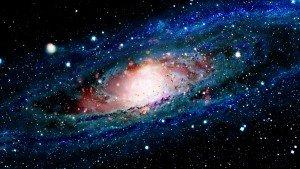
It has been called the great beyond or the final frontier and it is a very well-known fact that we know so little about space. Our technology is currently so rudimentary that we can't actually explore it like we wanted to, no matter how much we desire to know the ultimate truth and find out what really lies out there, so far away from our reach. But the facts that we do know about space is mind-blowing in and of itself, so here are 10 cool fact about space, that will blow your mind!
#1. Space is completely silent
There is actually no discernible sound in outer space, which makes is a completely weird place for us, giving that we come from a planet were sound is all around, at all times. The lack of any noise is due to the fact that sounds need a medium to journey through and, since there's no atmosphere in outer space, sound can't propagate.
#2. The footprints on the Moon will be there forever, probably
When the Apollo astronauts first set foot on the surface of the Moon, their space suited feet left footprints in the soil. Since the Moon has no atmosphere of its own, there is no wind, water nor erosion that could wash them off, which is why scientists estimate they will be there for at least 100 billion more years.
#3. Our solar system is actually...the sun
In a whopping proportion of 99%, the sun takes up the whole of our solar system. The star is so big and so dense that it doesn't leave much room for anything else. This is also why it's at the center of our system and has enough gravitational mass to keep all the other planets revolving around it.
#4. The sun will implode
And speaking of the sun, most astrophysicists subscribe to the theory that says our solar system will cease to exist at some point because our sun will keep getting bigger and bigger, engulfing some of the planets nearest to him and it will collapse on itself, leaving nothing in its stead but a vast empty nothingness. If it won't engulf the earth as well, life on our planet will die nonetheless, because of radiation or lack of warmth and light.
#5. String theory
There is a widely accepted theory in the world of physics about the universe, which says that it's not the only one in existence. There are actually multiple parallel universes, which we cannot see or perceive in any way, very close to ours. This is why they claim the correct term shouldn't be 'universe', but 'multiverse'.
#6. Metals in space
If there are two pieces of metal of exactly the same type in space and they touch, they will bond and remain like that forever. The effect has been dubbed 'cold welding'. The reason is even more astounding than the fact. In space, unlike on earth, atoms have absolutely no idea they belong to different bodies, so they simply stick together and never let go.
#7. Our moon is the only one without a name
Different planets in our solar system have a number of moons, gravitating around them. The number depends on how big the planet really is. The bigger the planet, the greater the gravitational pull. We have managed to name all of them, giving them titles such as Elara, Europa, Leda, Mneme, Thebe, all belonging to Jupiter or Atlas, Calypso, Hyperion, Phoebe, Titan and Tethys, all belonging to Saturn. Only ours is called 'The Moon'.
#8. White holes
There is a mathematic principle which, when applied, gives the result that white holes can actually exist. A white hole is a definite area in spacetime which cannot be entered from the outside, but from which light and matter can escape. We have never found a white hole.
#9. Good night on Uranus is (almost) permanent
Uranus has a very special tilt as far as its position to our Sun is considered. And this is why one night on Uranus lasts for 21 years continuously, until the planet manages to revolve and step into the light again. Another cool fact about Uranus is that almost all of its known moons have been named after the characters in A Midsummer Night's Dream.
#10. Black holes eat planets
And they literally eat them whole. If a planet gets close enough to a black hole, its huge amount of gravity will actually tear the planet apart down to the last grain of debris and it will swallow it whole. It has happened in other galaxies than ours and scientists say it was both fascinating and terrifying to watch.
And, as a last bonus cool fact about space, even though we still know so little about it, due to our toddler-like pieces of technology, we still know more about space than we do about the depths of our oceans.
Comments
comments

